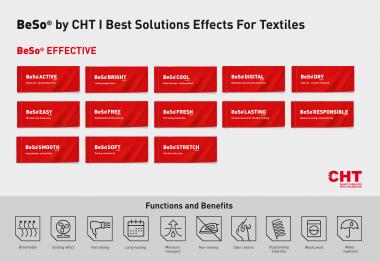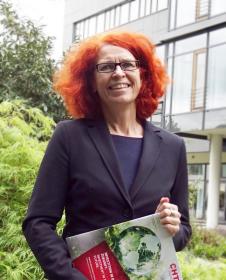CHT mit nachhaltigen Hilfsmitteln auf Techtextil 2024
Vom 23. bis 26. April präsentiert die CHT auf der Techtextil 2024 nachhaltige Hilfsmittel für technische Textilien.
Das Produktportfolio der CHT Gruppe umfasst wässrige, aber auch silikonbasierte (z.B. LSR) Ausrüstungs- und Beschichtungssysteme, die neue innovative Funktionalitäten zulassen.
Produkte der TUBCOSIL-Reihe sind LSR-Beschichtungen, die auf fast allen Textilien und Nonwoven appliziert werden können. Aufgrund ihrer Materialeigenschaften können sie höchste technische Anforderungen hinsichtlich Beständigkeit, Mechanik, Haptik und Optik erfüllen. TUBCOSIL-Produkte sind lösemittelfrei und somit auch aus ökologischer Sicht interessant.
Ein sortenreines Endprodukt (z.B. Teppiche, Filter, Gepäcknetze usw.) lässt sich leicht recyceln und kann damit dem Wertstoffkreislauf wieder zugeführt werden. CHTs TUBICOAT PET-Linie ist speziell für sortenreine Materialien auf Basis Polyester (PES) entwickelt worden.
TUBINGAL® RISE ist der erste Textilweichmacher der CHT Gruppe aus recycelten Silikonen. Ganz im Sinne der Kreislaufwirtschaft werden „End-oflife“-Silikone wiederverwertet und mit Emulgatoren aus nachwachsenden Rohstoffen zu einem neuen hydrophilen Weichmacher formuliert. Die Produktqualität ist identisch zu einem Silikonweichmacher aus Primärrohstoffen – nur nachhaltiger. TUBINGAL® RISE ist für alle Faserarten geeignet.
Ebenfalls nach den Prinzipien der Kreislaufwirtschaft hat die CHT Gruppe das Produkt ARRISTAN rAIR entwickelt. Hierbei werden Kunststoffabfälle in ein hochwertiges Textilveredelungsprodukt umgewandelt, um damit beispielsweise ein optimales Feuchtigkeitsmanagement bei Sport- und Aktivbekleidung zu erzielen. Weitere Anwendungsfelder sind Socken und Strumpfhosen im Bekleidungsbereich, Filtrationsmedien und Vliesstoffe im Bereich der technischen Textilen sowie Kissen und Vorhänge bei den Heimtextilien.
POLYAVIN bPEN ist die neue Plug-in-Lösung zum Ersatz von fossilen Rohstoffen. POLYAVIN bPEN ist das erste Ausrüstungsmittel mit einer Kohlenstoffaufnahme. Die Reduktion wird durch die Verwendung von biobasierten Rohstoffen, die Kohlendioxid aus der Atmosphäre binden, erreicht. Das Produkt kann als Prozesshilfsmittel eingesetzt werden, um die Reibung von Garnen zu verringern, um Nähschäden bei der Konfektionierung zu verhindern, um gleichmäßige Raueffekte zu erzielen sowie um das Sanforisieren/Kompaktieren von Maschenwaren und Geweben zu unterstützen. POLYAVIN bPEN eignet sich auch als Leistungsadditiv zur Erhöhung der Reiß- und Scheuerfestigkeit sowie zur Veränderung der Haptik.
Produkte der APYROL-Reihe sind Flammschutzmittel, die im Brandfall die Flammenausbreitung zeitlich verzögern und so gefährdeten Personen mehr Zeit für Rettungs- bzw. Löschmaßnahmen oder zur Flucht verschaffen.
Eine Weiterentwicklung, speziell für die Anforderungen im Bereich wässriger Beschichtungen, stellt die neue PFC-freie Hydrophobierungsgamme unter der Bezeichnung ECOPERL COAT dar.
Die TUBICOAT PU ECO-Gamme umfasst biobasierte Beschichtungslösungen auf Basis von wässrigen Polyurethandispersionen.
CHT Germany GmbH












